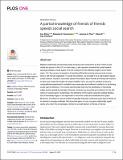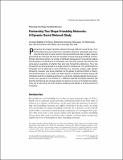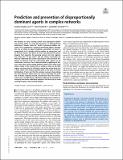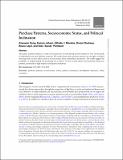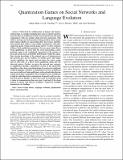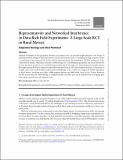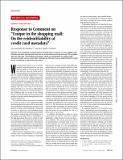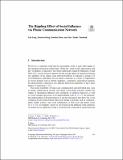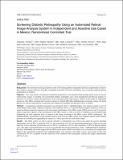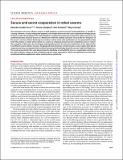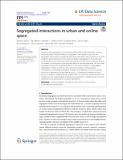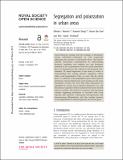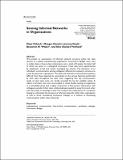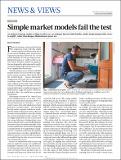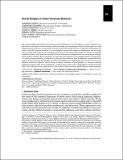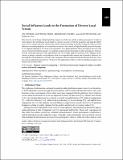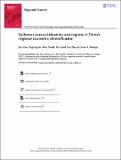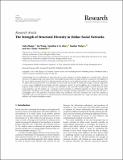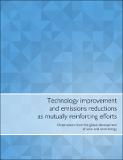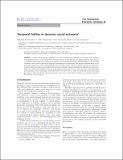Browsing Institute for Data, Systems, and Society by Title
Now showing items 40-59 of 71
-
A partial knowledge of friends of friends speeds social search
(PLoS ONE, 2021-08-19)Milgram empirically showed that people knowing only connections to their friends could locate any person in the U.S. in a few steps. Later research showed that social network topology enables a node aware of its full routing ... -
Partnership Ties Shape Friendship Networks: A Dynamic Social Network Study
(Social Forces, 2015-06-26)Partnership ties shape friendship networks through different social forces. First, partnership ties drive clustering in friendship networks: individuals who are in a partnership tend to have common friends and befriend ... -
Prediction and prevention of disproportionally dominant agents in complex networks
(Proceedings of the National Academy of Sciences, 2020-11-03)We develop an early warning system and subsequent optimal intervention policy to avoid the formation of disproportional dominance (“winner takes all,” WTA) in growing complex networks. This is modeled as a system of ... -
Purchase Patterns, Socioeconomic Status, and Political Inclination
(The World Bank Economic Review, 2020-02)This paper analyzes millions of credit card transaction records during several months for tens of thousands of individuals from two different countries. The study shows that, purchase patterns are strongly correlated with ... -
Quantization Games on Social Networks and Language Evolution
(IEEE Transactions on Signal Processing, 2021-06-18)Motivated by collaboration in human and human-robot groups, we consider designing lossy source codes for agents in networks that are in different statistical environments but also must communicate with one another along ... -
Representativity and Networked Interference in Data-Rich Field Experiments: A Large-Scale RCT in Rural Mexico
(The World Bank Economic Review, 2020-02)Modern availability of rich geospatial datasets and analysis tools can provide insight germane to the design of field experiments. Design of field experiments, and in particular the choice of sampling strategy, requires ... -
Response to Comment on “Unique in the shopping mall: On the reidentifiability of credit card metadata”
(Science, 2016-03-18)Sánchez et al.’s textbook k-anonymization example does not prove, or even suggest, that location and other big-data data sets can be anonymized and of general use. The synthetic data set that they “successfully anonymize” ... -
The Rippling Effect of Social Influence via Phone Communication Network
(Springer, Cham, 2018-06-22) -
Screening Diabetic Retinopathy Using an Automated Retinal Image Analysis System in Independent and Assistive Use Cases in Mexico: Randomized Controlled Trial
(JMIR Formative Research, 2021-08-26) -
Secure and secret cooperation in robot swarms
(Science Robotics, 2021-07-28)The importance of swarm robotics systems in both academic research and real-world applications is steadily increasing. However, to reach widespread adoption, new models that ensure the secure cooperation of large groups ... -
Segregated interactions in urban and online space
(EPJ Data Science, 2020-07-10)Urban income segregation is a widespread phenomenon that challenges societies across the globe. Classical studies on segregation have largely focused on the geographic distribution of residential neighborhoods rather than ... -
Segregation and polarization in urban areas
(Royal Society Open Science, 2019-10-23)Social behaviours emerge from the exchange of information among individuals—constrained by and reciprocally influencing the structure of information flows. The Internet radically transformed communication by democratizing ... -
Sensing Informal Networks in Organizations
(American Behavioral Scientist, 2014-11-21)We present an examination of informal network structure within the sales division of a global manufacturing organization. Sociometric Badges were used to collect data on face-to-face interactions over a total of 8 weeks, ... -
Simple market models fail the test
(Nature, 2015-09-22) -
Social Bridges in Urban Purchase Behavior
(ACM Transactions on Intelligent Systems and Technology, 2017-12)The understanding and modeling of human purchase behavior in city environment can have important implications in the study of urban economy and in the design and organization of cities. In this article, we study human ... -
Social Influence Leads to the Formation of Diverse Local Trends
(Proceedings of the ACM on Human-Computer Interaction, 2021-10-18)How does the visual design of digital platforms impact user behavior and the resulting environment? A body of work suggests that introducing social signals to content can increase both the inequality and unpredictability ... -
Spillovers across industries and regions in China’s regional economic diversification
(Regional Studies, 2021-03-31)Industrial diversification depends on spillovers from related industries and nearby regions, yet their interaction remains largely unclear. We study economic diversification in China during the period 1990–2015 and present ... -
The Strength of Structural Diversity in Online Social Networks
(Research, 2021-05-26)Understanding the way individuals are interconnected in social networks is of prime significance to predict their collective outcomes. Leveraging a large-scale dataset from a knowledge-sharing website, this paper presents ... -
Technology Improvement and Emissions Reductions as Mutually Reinforcing Efforts: Observations from the Global Development of Solar and Wind Energy
(MIT, 2015-11-13)Mitigating climate change is unavoidably linked to developing affordable low-carbon energy technologies that can be adopted around the world. In this report, we describe the evolution of solar and wind energy in recent ... -
Temporal fidelity in dynamic social networks
(The European Physical Journal B, 2015-10-07)It has recently become possible to record detailed social interactions in large social systems with high resolution. As we study these datasets, human social interactions display patterns that emerge at multiple time scales, ...

